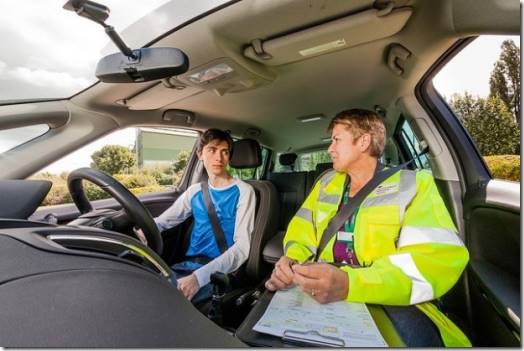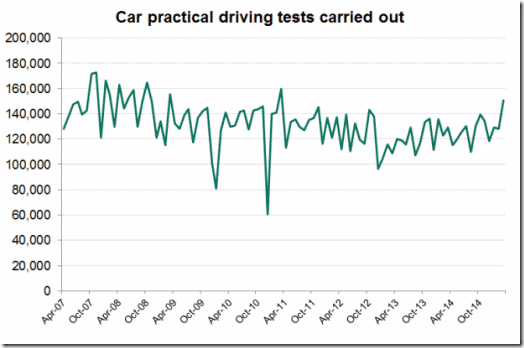I’ve heard a lot of complaints lately about the waiting times for driving tests. DVSA knows there is a problem and it is trying to deal with it though what that article doesn’t mention is the back door solution also being looked at, which involves making the test so easy that a monkey could pass it. Mark my words: that second solution is the one that they’ll go with (assuming the public consultation that will follow the trial a) doesn’t overwhelmingly come out against it, and b) if it does, the consultation isn’t ignored).
That Despatch article explains why waiting times have gone up. First, there is the upturn in the economy, which means people are taking tests in greater numbers (for many, it adds a vital string to their bow when job hunting). Second, DVSA says it has had more examiners retiring. Third, DVSA says there has been a surge in 20-somethings taking their tests after putting it off (I’m not sure why they give this as a separate reason, as it is just the first one worded differently.
Quite frankly, DVSA should have seen the examiner crisis coming and dealt with it long before it became a problem. Come to think of it, they also ought to have anticipated the country coming out of recession, because it was pretty bloody obvious that it was going to end sooner or later. I detected the upturn as long ago as early 2014 – I wrote about it on the blog – yet DVSA says it only predicted an increase in the number of tests “late last year”. I’m sure I recall them predicting a fall in the numbers of those taking tests within the same time frame as all of this even though their own data show a sustained increase in tests from January 2013 onwards (and that was during the depths of the recession).
None of it makes any sense. And to top it all, there’s only been a 5% increase in the number of tests taken between January and March 2015 compared with the same period last year – yet waiting times have gone up by more than 100%.
Recruiting new examiners will take ages. From what I’ve read on certain forums they’re only on the situational judgement test (the earliest part of recruitment process) even now, in spite of claiming that recruitment started in October 2014 (it may be a different intake, of course, though it is more likely that “starting” something in civil service speak translates into taking almost a year before it turns into “doing” it). The actual training and probationary periods alone add up to over 10 months before anyone can be a fully-functioning examiner, and before that there are other tests intended to sort the wheat from the chaff. Allowing for the typical civil service efficiency noted above you can probably add up to six weeks of dead time between each of the stages, so we’ll be lucky if we see any examiners from this source before 2017. Of course, that leaves another possible back door open, and I can see them trying to fast track unsuitable people through the training programme.
Phew. I wrote a lot more than I intended there once I got going. The real reason I did this article, though, was the because of an item I got on the newsfeeds concerning Liverpool’s test waiting times – between 9 and 13 weeks, apparently. Well, my local test centres are officially claiming between 9 and 13 weeks, but I can assure you that one pupil who booked a test a few weeks ago could only get one in January 2016. When I worked it out, it must have been about 19 or 20 weeks. That’s around 10 weeks more than the official figure, and it’s a discrepancy I have been seeing for the whole of this year – with actual waiting times being considerably (and consistently) greater than the officially reported ones.
I also note from that news item that a local instructor is claiming that the long waiting times are costing him work, because people want tests quickly and they therefore go to other parts of the country if they can’t get them in Liverpool! Now, it may be a Liverpool thing, and perhaps people there really do go elsewhere if they can’t get an early test date. But the question I would ask is: where? The Manchester area has official waiting times of between 5 and 9 weeks, which in reality is probably closer to 15 weeks. Leeds is officially almost as bad as Liverpool. Anyone traveling further afield than that is crazy. My own pupils have been shopping around, I must admit, but only to book tests at the local test centre with the best time. Anyone who comes to me in September wanting to pass before Christmas, I tell them straight that they have got virtually no chance – and especially not if they haven’t even done their theory test yet.
Incidentally, that same instructor also claims his franchisees all have full diaries. In that case, you can’t say that you’re losing work – turning it down because you can’t accommodate it is not “losing” it. You’re only losing it if you want it and need it, but it goes elsewhere.
He also says that DVSA don’t pay examiners to work weekends anymore. Again, I can’t speak for Liverpool, but DVSA says in that Despatch article I linked to at the start that examiners are being encouraged “to work additional hours to provide more tests.” One of my current pupils has got a Sunday test in mid-October, which he booked in early August (that was 10 weeks even then), so – and as I say, unless Liverpool is different – that instructor’s comments are incorrect.
Another Liverpool instructor is quoted as saying that the number of tests decreased over the last few years. I refer again to the official DVSA figures, which do not back up this claim at all. In December 2012 they carried out around 100,000 tests, but since then the number has steadily increased, to over 150,000 in April 2015. The most tests conducted in a single month was around 170,000 in October 2007 so we are very nearly at that same level right now.
The only relevant factor has to be the number of people eligible for (and trying to) take the driving test. Irrespective of retirements or anything else, if they are conducting almost as many tests as they were back in 2007 (and they are), then if the waiting time is increasing it simply has to be just that more people want tests than in 2007! And only that.
Of course, you then have to ask who these additional test candidates really are. Can they all be 20-somethings who decided not to learn during the recession? My own observations suggest not.